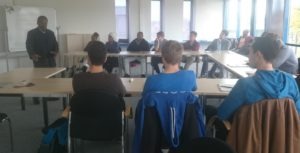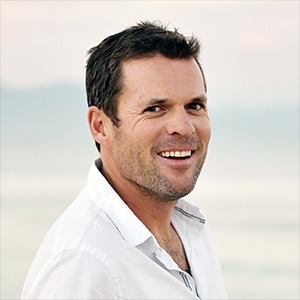Visiting the Centre for Business and Technology in Africa at the Flensburg University of Applied Sciences is akin to making a pilgrimage to “the north”. Arriving

Dr. Kenneth instilling knowledge
at my destination in this historic city at the tip of the Flensburger Förde, I couldn’t help but think it as a convenient gate away from Windhoek. As if reading my mind, my host made a point of reminding me how lucky I was to arrive when it wasn’t raining. Apparently, the skies had conspired to give me a rare reception for this time of the year.
The reason for visiting this northern Germany city of 60,000 ± inhabitants was to teach in the Centre for Business and Technology in Africa Autumn School. In my briefing it has been made clear that participating in this exchange program is a ritual for new NGCL staff and therefore part and parcel of my job description. But, having been here and met students, faculty as well as the University management, I would definitely recommend it to anyone else. That said, I didn’t have to wait long after arriving before getting down to business and being introduced to the learners. In less than 24 hours I was amongst a lively group comprising German, Kenyan and Namibian students. Through DAAD and their scholarships the Namibian students had made their way to Flensburg and where gaining valuable international experience and education. Despite it being a cold and wet Saturday morning, the students showed up, and on time! The discussion in this first encounter revolved around etiquette and culture, was led by my host, Janntje Böhlke-Itzen.
Next was an invitation to present a “Management Case Study” in Prof. Thomas Schmidt’s class. This was a scheduled single three-hour session and therefore I had to make a decision whether or not to use all three cases I had prepared – a rural-, urban- or regional-scale African case. After presenting the situated facts of the case to the learners as told by the businesswomen themselves (i.e., using photovisual), the students were then given tasks to carry out. Split into three groups, they were discussed and presented (a) challenges the enterprises face, (b) how those challenges were likely to change? (c) Solutions to address identified problems, and (d) how they would you go about implementing their solutions?
The discussions followed by presentations of their ideas proved a very effective learning experience for the German students since this was new to most of them. The tasks and activities gave the everyone involved the opportunity to develop and share their ideas, applying their diverse knowledge and experiences to solving practical business and technology problems in Africa. This was a strong testament to the relevance of both the Autumn School and the Centre for Business and Technology in Africa.
My third and final dialogue with the learners was at a seminar on culture and etiquette, which turned out to be a very engaging experience for the learners as well as myself and my host. Building on the theoretical foundations of intercultural experiences developed by Janntje at the first seminar referred to earlier, this last session delved into culture as practice. Through open communication and dialogue, we explored topics such as scholarship as acculturation, plagiarism: ethical dilemma on campuses, supervisor-student relationship, driving behaviour, dress code, et cetera, using multiple (German, Kenyan and Namibian) social and cultural contexts. In the final analysis, the take home from this visit to Flensburg University of Applied Sciences is that such exchanges are more than symbolic. Their true significance lies in the deeper learning experiences they engender.
You must be logged in to rate posts.



